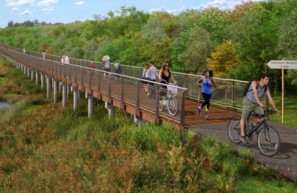
Green Infrastructure ꟷ a phrase that has become quite common, is generating lots of discussion. Perhaps that’s because of the significant amount of funding now available for projects that fall into this category. These types of projects promote environmentally friendly solutions to current problems, and the funding supports rain gardens, stormwater parks, permeable pavement, subsurface detention systems, tree planting, solar installations, and electrified school buses. Primarily, the projects are designed for resiliency and protection of the country’s environment. The recent wildfires that killed so many people in Hawaii resulted from a weather-related disaster in a region where a focus on resiliency had not been adequately addressed. Recent flash floods in California destroyed property, damaged infrastructure, and took lives even though the state is a leader in launching projects that focus on sustainability.
In 2022, officials in New York allocated $4.2 billion for climate-related projects through the Clean Water, Clean Air and Green Jobs Environmental Bond Act. The funding is earmarked for projects that will protect New York citizens from extreme weather. Project components will likely include flood risk mitigation, upgrades to protect water infrastructure, land rehabilitation and conservation.
The city of Duluth, Minnesota, received $25 million from the Rebuilding American Infrastructure with Sustainability and Equity (RAISE) program to support a rehabilitation project focused on rehabilitating a commercial and cultural area by restoring an aging stretch of road. Construction work will include roadway repair and expanding and upgrading existing utilities. It will also require a variety of green infrastructure efforts, such as developing green areas, trails, and EV charging stations. The plan outlines other amenities to spur commercial activity in the area, including enhanced lighting, improved signage, wayfinding technology, and many planters and trash bins.
A new federal funding program that will flow through the Federal Motor Carrier Safety Administration just recently announced funding of $80 million for four truck parking projects. Each initiative will improve truck drivers’ safety conditions and reduce their carbon footprint. Recipients include:
- Tennessee – $11 million for 125 bus parking spaces along I-40, a critical freight corridor:
- Florida – $15 million for 120 parking spaces, electric charging stations;
- Texas – $22.9 million to construct a truck parking plaza with short and long-term parking spaces with restroom and shower facilities as well as 24-hour monitored security; and
- Louisiana – $10 million for a truck parking facility near the port. The $80 million FMCSA grants will further expand truck parking, research electronic logging devices, enhance electronic screening technologies to detect vehicle violations and combat human trafficking.
The Staten Island City Planning Commission voted recently to authorize a program called Yes for Carbon Neutrality. The program will focus on an estimated $20 billion proposal which will remove certain zoning restrictions to retrofit more than 50,000 buildings and one million homes with energy-efficient solutions, allocate approximately 400 million square feet for EV charging stations, and modernize the city’s water, compost, and recycling regulations. These projects may span the next ten years, but some building retrofitting will start as early as 2024. There are plans to place solar canopies for 8,500-plus acres of parking lots. When completed, that project will provide power to more than 130,000 homes. The plan also involves decarbonizing the city’s buildings to improve energy efficiency. That effort will include replacing boilers and furnaces with electric heat pumps and improving walls and window insulation. Eco-friendly retrofits may be made to over 1 million units in 50,000 buildings.
New Castle County in Delaware will use $23 million in federal RAISE funding to construct the Newport River Trail, a 2-mile walking and biking path connecting Newport, New Castle, and Wilmington, Delaware. The project will be designed to reduce carbon emissions by providing space for cyclists. It will also offer recreational green space for pedestrians in New Castle County. The trail will be ADA accessible and it will include bridges and elevated walkways over tidal wetlands and the Christina River. Construction is planned for 2024.
The city of Burlington, Vermont, will redesign three major streets in downtown Burlington because the roadways have a history of persistent poverty and limited walkability. Construction plans will be designed to create more walking space for pedestrians and cyclists and thereby limit vehicle traffic to reduce carbon emissions. Damaged sidewalks and pavement will undergo rehabilitation and amenities will be included to boost community involvement and commercial investment along the streets. A $24.8 million RAISE Grant will cover approximately 80% of the project and the remaining 20% of funding will come from the state. The project is currently in the design phase.
Infrastructure reform in America has many faces, and funding will be available for projects of all types over the next several years. Every state received funding allocations from Congress and most upcoming projects are currently in the design phase with launch dates scheduled for the near future.
